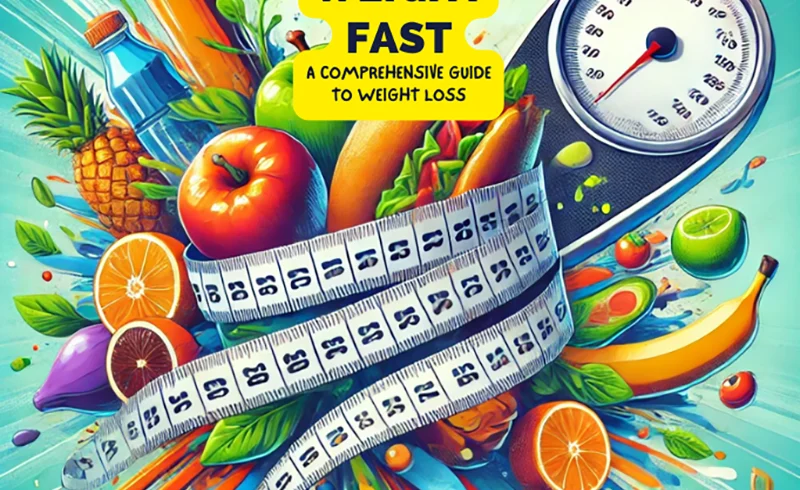
Rapid weight loss can be an attractive goal, but it’s essential to approach it with care to ensure you achieve lasting results without compromising your health. In this article, we’ll explore practical tips and strategies for losing weight fast while keeping safety at the forefront of your efforts.
Understanding Rapid Weight Loss
What Does “Fast Weight Loss” Mean?
Fast weight loss typically refers to losing 1-2 pounds per week, a pace that is generally considered safe for most people. However, some methods promise more dramatic results, which can be tempting but may not be sustainable. Setting realistic goals and understanding the timeframe for healthy weight loss is crucial. Rapid weight loss often requires a combination of dietary changes, exercise, and lifestyle adjustments.
The Science Behind Weight Loss
At its core, weight loss occurs when you burn more calories than you consume, creating a calorie deficit. Your body uses stored fat for energy, leading to weight loss. However, metabolism—your body’s process of converting food into energy—also plays a significant role. The more you understand how to balance calorie intake with physical activity, the more effectively you can manage your weight.
Diet Strategies for Quick Weight Loss
Calorie Reduction and Smart Eating
Reducing your calorie intake is one of the most straightforward methods to lose weight quickly. This doesn’t mean you have to starve yourself; instead, focus on eating smarter. Opt for nutrient-dense foods that provide essential vitamins and minerals without the extra calories. For example, choose vegetables, lean proteins, and whole grains over high-calorie, low-nutrient options like sugary snacks and processed foods.
Portion control is another key factor. By eating smaller portions, you can enjoy your favorite foods without overindulging. Learning to read labels and being mindful of serving sizes can help you stay within your calorie goals.
High-Protein, Low-Carb Diets
High-protein diets are effective for rapid weight loss because protein increases satiety, helping you feel fuller for longer. This reduces the likelihood of overeating. Additionally, protein helps preserve muscle mass during weight loss, which is vital for maintaining a healthy metabolism.
Low-carb diets, such as the ketogenic diet, can accelerate weight loss by reducing the body’s glycogen stores and forcing it to burn fat for energy. These diets often lead to quick initial weight loss due to water loss, followed by steady fat loss. However, it’s important to choose healthy sources of protein and fat to ensure balanced nutrition.
Intermittent Fasting
Intermittent fasting (IF) is another popular method for losing weight quickly. IF involves cycling between periods of eating and fasting. For instance, the 16/8 method involves fasting for 16 hours and eating within an 8-hour window. This approach can reduce your overall calorie intake and improve your body’s fat-burning efficiency.
Studies suggest that intermittent fasting not only aids in weight loss but also improves metabolic health. However, it’s crucial to listen to your body and choose a fasting schedule that aligns with your lifestyle and energy needs.
Exercise Regimens for Rapid Weight Loss
The Role of Cardio in Fast Weight Loss
Cardiovascular exercises are highly effective for burning calories and shedding fat quickly. High-intensity interval training (HIIT), in particular, has gained popularity for its efficiency. HIIT involves short bursts of intense exercise followed by brief periods of rest. This method keeps your heart rate elevated, leading to more calories burned in less time compared to steady-state cardio.
Examples of effective cardio workouts include running, cycling, and swimming. Incorporating these activities into your routine at least 3-4 times a week can significantly boost your weight loss efforts.
Strength Training to Boost Metabolism
While cardio is excellent for burning calories, strength training is essential for maintaining and building muscle mass. Muscle tissue burns more calories at rest than fat tissue, so the more muscle you have, the higher your resting metabolic rate. This means you’ll burn more calories even when you’re not exercising.
Incorporate simple strength training exercises like squats, lunges, push-ups, and weight lifting into your routine. Aim to work out each major muscle group 2-3 times a week to see the best results.
Lifestyle Changes to Support Fast Weight Loss
Managing Stress and Sleep
Stress and lack of sleep can derail your weight loss efforts by affecting your hormones and increasing your appetite. Chronic stress raises cortisol levels, which can lead to increased fat storage, particularly around the abdomen. Similarly, insufficient sleep disrupts the balance of hunger hormones, making you more likely to overeat.
To manage stress, consider activities like yoga, meditation, or deep breathing exercises. Prioritizing sleep by maintaining a consistent sleep schedule and creating a restful environment can also make a significant difference in your weight loss journey.
Staying Hydrated
Staying hydrated is often overlooked but is crucial for weight loss. Drinking water helps control your appetite, boosts metabolism, and aids in the breakdown of fat cells. Sometimes, thirst can be mistaken for hunger, leading to unnecessary snacking. Aim to drink at least 8 glasses of water a day, and more if you’re active or live in a hot climate.
You can increase your water intake by carrying a water bottle with you, setting reminders to drink throughout the day, and including water-rich foods like fruits and vegetables in your diet.
Potential Risks and Considerations
The Dangers of Crash Diets
Crash diets, which promise extreme weight loss in a short period, can be dangerous and counterproductive. These diets often involve severe calorie restriction or the elimination of entire food groups, leading to nutrient deficiencies, muscle loss, and a slowed metabolism. Additionally, the weight lost on crash diets is often quickly regained once normal eating resumes.
Sustainable weight loss is about making gradual, healthy changes that you can maintain long-term. While the goal may be to lose weight quickly, it’s essential to prioritize methods that support overall health and well-being.
Knowing When to Seek Professional Help
If you find yourself struggling to lose weight despite your best efforts, it may be time to consult a healthcare professional. A doctor or registered dietitian can provide personalized advice and help you develop a weight loss plan that suits your individual needs and health status. Additionally, they can monitor your progress and make adjustments to your plan as needed.
It’s also important to recognize signs that your weight loss plan may be too extreme, such as constant fatigue, dizziness, or a significant reduction in energy levels. In such cases, professional guidance is crucial to prevent potential health risks.
Conclusion
Losing weight fast is an achievable goal, but it requires a balanced approach that includes smart dietary choices, regular exercise, and lifestyle adjustments. While it’s tempting to go for quick fixes, sustainable practices are key to long-term success. Remember, your health should always be the top priority. Start with small, manageable changes, monitor your progress, and stay committed to your goals. With the right strategies, you can achieve the results you desire safely and effectively.




